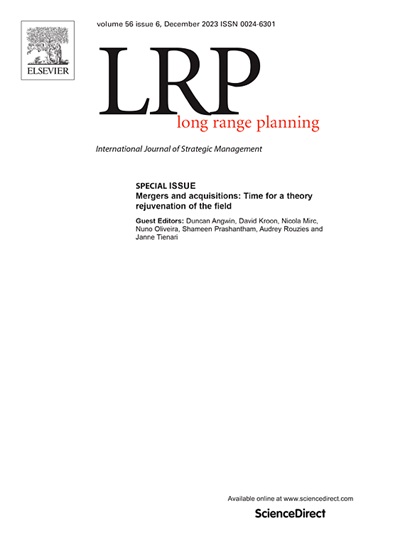Strategic governance of blockchain platforms: From centralized to open source control systems
IF 6.3
2区 管理学
Q1 BUSINESS
引用次数: 0
Abstract
This perspective article focuses on blockchain platforms as new forms of organization and governance within the decision-making centralization/decentralization continuum. It aims to address the following research questions: How does the context of blockchain and community-based governance creates new theoretical challenges regarding the traditional centralization/decentralization debate in corporate governance? What are the main cost-benefit trade-offs regarding (de) centralization of decision-making process in a blockchain platform's organizational “ecosystem”? The paper outlines the blockchain platforms' governance spectrum that ranges from a high degree of centralization to an “open source” governance model. This is followed by a discussion of drivers of governance models including an interface between platform-specific investment and heterogeneity of platform participants. The paper concludes with an outline of implications for future research and practice.
区块链平台的战略治理:从集中式控制系统到开源控制系统
这篇透视图文章主要关注区块链平台作为决策集中化/去中心化连续体中的组织和治理的新形式。它旨在解决以下研究问题:区块链和基于社区的治理背景如何为公司治理中传统的集中/分散辩论带来新的理论挑战?在区块链平台的组织“生态系统”中,关于决策过程的(去)集中化,主要的成本效益权衡是什么?本文概述了区块链平台的治理范围,从高度集中化到“开源”治理模型。接下来将讨论治理模型的驱动因素,包括特定于平台的投资和平台参与者的异质性之间的接口。论文最后概述了对未来研究和实践的启示。
本文章由计算机程序翻译,如有差异,请以英文原文为准。
求助全文
约1分钟内获得全文
求助全文
来源期刊

Long Range Planning
Multiple-
CiteScore
13.00
自引率
7.10%
发文量
75
期刊介绍:
Long Range Planning (LRP) is an internationally renowned journal specializing in the field of strategic management. Since its establishment in 1968, the journal has consistently published original research, garnering a strong reputation among academics. LRP actively encourages the submission of articles that involve empirical research and theoretical perspectives, including studies that provide critical assessments and analysis of the current state of knowledge in crucial strategic areas. The primary user base of LRP primarily comprises individuals from academic backgrounds, with the journal playing a dual role within this community. Firstly, it serves as a platform for the dissemination of research findings among academic researchers. Secondly, it serves as a channel for the transmission of ideas that can be effectively utilized in educational settings. The articles published in LRP cater to a diverse audience, including practicing managers and students in professional programs. While some articles may focus on practical applications, others may primarily target academic researchers. LRP adopts an inclusive approach to empirical research, accepting studies that draw on various methodologies such as primary survey data, archival data, case studies, and recognized approaches to data collection.
 求助内容:
求助内容: 应助结果提醒方式:
应助结果提醒方式:


